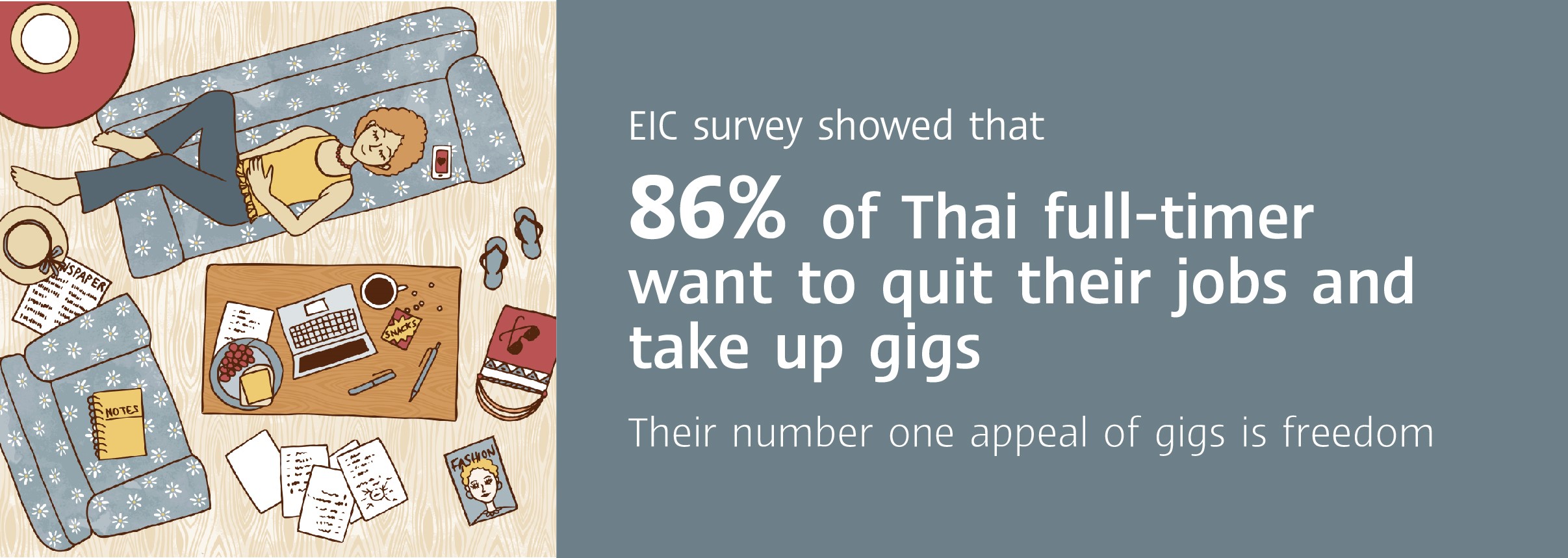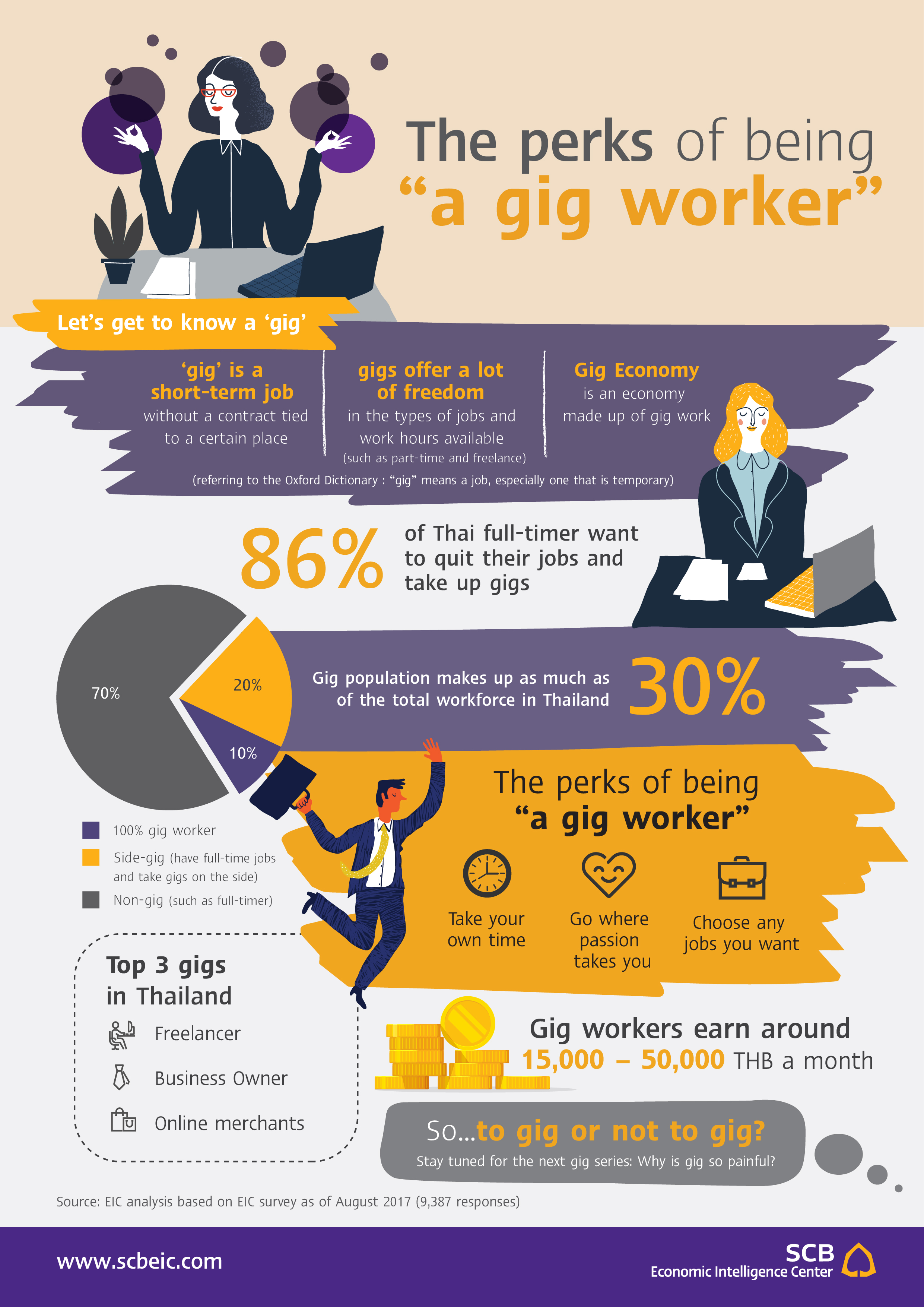EIC Research Series: The perks of being a gig worker
First things first, we should start by clarifying that the word “gig” here has nothing to do with either “more than a friend but less than a lover” relationships or the act of cheating, as many would presume. The two words may sound the same (in Thai) but their meanings are totally different.
EIC Research Series: About gigs EP1
By: Kunyaruk Naiyaraksaree

First things first, we should start by clarifying that the word “gig” here has nothing to do with either “more than a friend but less than a lover” relationships or the act of cheating, as many would presume. The two words may sound the same (in Thai) but their meanings are totally different.
The word “gig” that we are talking about here refers to short-term jobs without a contract tied to a certain place, such as part-time or freelance work. Gigs offer a lot of freedom in the types of jobs and work hours available. Compensation depends on how many jobs are completed and how difficult they are. An economy made up of these gigs is called a "Gig Economy.”
For Thai people, this new buzzword may not sound familiar, but the truth is that the gig economy has been a part of Thai society for a long time. As a farming country, there is a high demand for labor jobs during planting or harvesting seasons, so during those seasons there are always temporary jobs in the fields. Another example; imagine our grannies in their 20s who just landed at Chinatown and started to settle down. The first jobs the grandpas took back then would be random delivery boys who were paid based on the number of trips they made. If a shop had no work available, they went to work for others. There was no commitment or contracts made. This kind of job was indeed a gig work and our grandpas back then could be called the gig workers.
Today gig economy is booming thanks to the Internet and a sharing economy. There are more types of gigs to choose from than ever. Riding the trend, young generations looking for freedom are flocking to gigs, so much so that they will perhaps replace some conventional office jobs soon.
But what exactly is so good about being a gig worker?
Let’s get to know the gig crowd
Before stepping into a gig world, let’s first look at how big the gig crowd is.
Although official numbers have not been published by any countries, leading consulting institution McKinsey Global has estimated that in the United States and Europe the gig population numbers around 162 million people, or about one-fourth of the working population. This is indeed a staggering figure. If the trend
continues, the gig population may take over the world in no time.

In Thailand, no official data has been collected either, but a survey by the EIC (based on 9,387 responses) found that the gig population makes up as much as 30% of the total workforce in Thailand. This means that for every 10 people you meet, three of them will be working a gig. And within those three, two will likely have full-time jobs and take gigs on the side, while the other one is a 100% gig worker (a freelancer, for example).
Some popular gig work in Thailand include freelancers, business owners, online merchants, and stock investors. Who are the freelancers? They can range from gardeners and coffee baristas to specialized professionals like doctors, graphic designers, lawyers, and financial advisors. As you can already see, the variety of gigs is huge, and it doesn’t even end there. For example, in Japan, middle-aged men take part in creative gig work called Ossan Rental (ossan means uncle in Japanese). The “ossans” can be hired to help clients do chores or to provide some good life advice – as they are all adults full of life experience. This business has proved very popular even though it has only been around for four years. The ossans also pull a nice pay, earning around 1,000 yen (around 300 baht) per hour.
Anyone can have a gig
To all the non-middle-age-male readers out there, don’t fret! You don’t have to be ossans to have a gig. And of course, the pay can be even better than 300 baht per hour.
The EIC survey showed that gig workers in Thailand come in all shapes and sizes, or more accurately, ages, income levels, and educational backgrounds. The largest group of gig workers is the baby boomers, most of whom already have a stable income that allows them to spend time as freelancers. As for how much money they make, gig workers earn between 9,000 baht to over 100,000 a month, with the majority of them making around 15,000-50,000 baht, depending on the types and quality of jobs, as well as how hard they work. Just like any other jobs in the world, the harder they work, the more they earn.
What we also find interesting is the diversity in the educational backgrounds of gig workers. As we have seen earlier, gig workers have been around in Thailand for a long time, taking up jobs like goods delivery or helping out on the farm. In the past these workers tended to be less educated, while the highly educated ones flocked to civil service jobs, considered highly prestigious decades back. But now a lot has changed, and gig workers include those without high school degrees as well as those with Ph.D. degrees.
The gig economy trend has changed the way we think about jobs. It has also thrown out some barriers that prevented some people from getting a job due to such things as age, educational background, race, or language. In the world of gigs, everybody can get a job as long as he or she has the skills, the energy,
and the time it takes.
Everybody wants to have a gig
So, up to here, anyone want to get a gig yet?
No need to be shy, you are not alone.

EIC survey showed that as many as 86% of Thai full-timer want to quit their jobs and take up gigs. This is such a huge number that it would make major employers in the country fall off their chairs. But more surprisingly, the portion of people who want to switch to gigs makes up of more than two-thirds of all types of groups, no matter how the group is defined, whether by age, occupation, income level, or financial needs. Yes, the results are the same, though the exact numbers for each group may differ somewhat. For example, interest in gigs is higher among private sector employees compared to those in the public sector and higher among Gen-Y people compared to baby boomers. But in general, the shares are all roughly in the same ballpark.
The number one appeal of gigs is freedom. Freedom defines a gig lifestyle. This is what the general public believes, for it is what famous gig economy platforms like Uber and Task Rabbit emphasize when recruiting partners, which in their cases mean drivers or contractors.
“Be your own boss and make money whenever you want” is what Uber tells us.
But even so, not everybody is willing or able to declare their freedom by quitting their jobs and taking up gigs. Given social values, responsibilities, and various other limitations, we are unfortunately not always free to do whatever we want.
Now, let’s hear what gig workers say about why they have chosen this path.
The perks of being a gig worker
Based on conversations with many gig workers and the EIC survey results, we discovered three main reasons why people choose to become gig workers.
Perk # 1 : Take your own time
This is the leading reason among both the people we interviewed and survey results. The ability to manage their own time is a major perk of gig workers. Let’s imagine that you are a freelancer. You can work whenever you want, either be an early bird, or sleep in and be a night owl. If you want to spend time with family, meet up with friends, study for exams, or run other chores, it’s all up to you. This may sound almost too good to be true, but remember that it can also turn out badly if you don’t have good time management skills. Some gig workers do have trouble separating their personal life from their working life.
Perk # 2 : Go where passion takes you.
With everybody nowadays talking about the importance of happiness, it is no wonder that some choose to leave high-paying full-time jobs to follow their passions. One of our friends who is a gig worker has always loved to do arts and crafts. After university she landed a stable well-paying full-time job. But she also started her own business on the side selling dried flower bouquets on social media. Even though she has to work on it after long days at the office and spend her weekends at the flower market instead of lounging at home, she insists that she will continue this small business because it makes her happy.
Perk # 3 : Choose any jobs you want.
Not only can gig workers choose to work whenever they want, but they can also choose the kind of jobs they want. Some may prefer variety to developing a broad experience. Others may choose something new to keep them from getting bored. Some may look for challenging tasks to improve their skills. And others may simply choose what they’re happy doing. If they are in full-time jobs, they will hardly ever enjoy such privilege of choice. Gig workers are without obligations and have no one telling them what to do. If they have to work with someone they don’t like, they can just say no and walk away. But that being said, the degree of choosiness dictates how many jobs they can take. We asked a friend who is a freelance interpreter how many jobs she gets, and she said there are always some as long as you are not too choosy.
A Thai saying says, “The greedy ones miss the fortune”. Likewise in this case, the choosy ones miss out on job opportunities, too.
There are a few other perks worth mentioning, although they were not among the top answers. First, when it comes to making money from gigs, the sky is the limit. Indeed, the more hardworking or talented you are, the more money you can make. This should be attractive for those who dream to become millionaires in no time. Second, there is no retirement age for gig workers. The EIC survey reveals that many gig workers are retired or approaching their sixties. As such, they don’t have to worry about what to do after they retire, as long as they have the right skills for their gigs. Another reason people mentioned is the absence of people problems. For gig workers, if they find good partners that’s great, but if not it doesn’t matter, because they’re only working together for a short period of time. Once the job is done, gone the annoying partners. No drama necessary.
Looking closely, we can see that all the perks of being a gig worker can be traced back to freedom of choice, whether it is choosing work hours, work types, income, or colleagues. Thus, it can be said that in today’s world full of customization, people do not only want customized products or experiences, but also the kind of work they wake up for every morning.
So this is probably the ultimate reason why everybody wants to have a gig. It allows them to choose
the kind of work that they want.
Now as we finish up, anyone want to get a gig yet?
